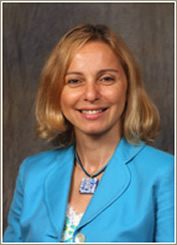Lina Beydoun speaks At PCC
Scholar on migration studies comes to PCC
 Lina Beydoun is a Brookings Doha Center – Qatar University visiting fellow. She is also assistant professor in the Anthropology and Sociology Department at Adelphi University in New York. She previously taught at George Mason University, where she also managed the Global Humanitarian Action and International Development programs in the Center for Global Education. She was also a lecturer in the Department of Interdisciplinary Studies at Wayne State University.
Lina Beydoun is a Brookings Doha Center – Qatar University visiting fellow. She is also assistant professor in the Anthropology and Sociology Department at Adelphi University in New York. She previously taught at George Mason University, where she also managed the Global Humanitarian Action and International Development programs in the Center for Global Education. She was also a lecturer in the Department of Interdisciplinary Studies at Wayne State University.
Beydoun specializes in human rights, migration, and citizenship, with a focus on Lebanon, Egypt, and Sierra Leone. She has conducted extensive research on Lebanese migration to Sierra Leone, and is currently examining the effects of the Arab Spring on minority rights in Egypt as well as the condition of stateless people in Kuwait. She managed several projects with Save the Children Foundation, UNICEF, and the Arab Council for Childhood and Development. Beydoun received her Ph.D. in sociology from Wayne State University and her B.A. in social and behavioral sciences from the American University of Beirut.
In her talk entitled “People on the Move: Migration Trends in Sub-Saharan Africa”, Beydoun will focus on key migration patterns throughout Africa, including, migrations into Africa (non-Blacks moving in during colonial times), out of Africa (focusing on more recent migrations to Europe through Spain and Italy with tragic consequences) and within Africa (e.g.refugees from Somalia in Kenya, labor migrants from various African countries to South Africa). She will also discuss the role of climate change and drought, key factors that lead increasingly to internal displacement than to protracted refugee situations.
Below is a video recording of her talk. For using this talk for instruction or curriculum, here is a summary of its major points and issues covered:
- Provides an overview of her lecture (0:27)
- Defines “Sub-Saharan Africa” (2:50)
- Shares her personal story of migration: (3:32)
- Begins to discuss colonialism in Africa, including the early 20 various ruling European countries. Contrasts a colonial map with one of Africa today. (7:00)
- Discusses how these “artificial” borders forced together separate ethnic groups and separated those groups that were united. (8:38)
- Outlines problems that this preferential treatment caused for this “privileged class” of immigrants. Refers to the 1962 amendment of Sierra Leone’s constitution, which aimed to limit Lebanese and Indian power. Those who were born in Sierra Leone needed to naturalize. (12:17)
- Covers the key reasons for the rise in migration during the post-colonial era: “economic collapse,” “brutal conflict,” “famine,” and “drought.” (20:20)
- Discusses typical migration patterns out of Africa into the E.U.. (23:50)
On Monday, January 28, from 10-11am, Professor Lina Beydoun spoke in the Cascade Morarity Auditorium on key migration patterns in Africa.
